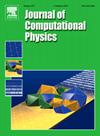Kalman filter-based dynamic mode decomposition for closed-loop flow control with noise-corrupted sensing
IF 3.8
2区 物理与天体物理
Q2 COMPUTER SCIENCE, INTERDISCIPLINARY APPLICATIONS
引用次数: 0
Abstract
The increasing adoption of dynamic mode decomposition with control (DMDc) in closed-loop flow control highlights a critical gap, with success in idealized conditions contrasting sharply with compromised accuracy in noise-prone scenarios. This study responds by presenting a rigorous analysis of the systematic bias induced by measurement noise and proposing the Kalman filter-based DMDc (KFDMDc) as a tailored solution. This analysis reveals the quantitative dependence of the bias on both data size and noise level, and demonstrates how noise confined to state measurements propagates nonlinearly to the control matrix. Moreover, the proposed KFDMDc algorithm directly alleviates systematic bias by employing a Kalman filter to estimate the true underlying states from noisy measurements, resulting in a significantly more accurate system identification. Numerical investigations on synthetic systems reveal a critical trade-off: the well-recognized accuracy of established diagnostic algorithms is often achieved at the expense of robustness and computational efficiency. As a result, these algorithms perform poorly when applied to time-varying controlled flow systems. In contrast, KFDMDc achieves a more favorable balance between robustness and satisfactory accuracy. The practical effectiveness of the proposed method is confirmed through closed-loop flow control simulations, achieving a reduction in convergence time at low noise levels while suppressing input perturbations by in high-noise regimes. Given the ubiquity of sensor noise in physical systems, the proposed KFDMDc provides a promising bridge between noise-free scenarios and the practical application of data-driven control.
基于卡尔曼滤波的动态模态分解在噪声感知闭环流控制中的应用
在闭环流量控制中越来越多地采用动态模态分解与控制(DMDc),这突出了一个关键的差距,在理想条件下的成功与在易受噪声影响的情况下的准确性形成鲜明对比。本研究对测量噪声引起的系统偏差进行了严格的分析,并提出了基于卡尔曼滤波器的DMDc (KFDMDc)作为定制解决方案。该分析揭示了偏差对数据大小和噪声水平的定量依赖,并演示了局限于状态测量的噪声如何非线性地传播到控制矩阵。此外,本文提出的KFDMDc算法通过使用卡尔曼滤波器从噪声测量中估计真实的底层状态,直接减轻了系统偏差,从而大大提高了系统识别的准确性。对合成系统的数值研究揭示了一个关键的权衡:建立的诊断算法的公认的准确性往往是以鲁棒性和计算效率为代价的。因此,这些算法在应用于时变控制流量系统时表现不佳。相比之下,KFDMDc在鲁棒性和令人满意的精度之间取得了更有利的平衡。通过闭环流控仿真验证了该方法的实际有效性,在低噪声条件下收敛时间缩短22.47%,在高噪声条件下抑制输入扰动74.63%。鉴于物理系统中无处不在的传感器噪声,所提出的KFDMDc在无噪声场景和数据驱动控制的实际应用之间提供了一个有希望的桥梁。
本文章由计算机程序翻译,如有差异,请以英文原文为准。
求助全文
约1分钟内获得全文
求助全文
来源期刊

Journal of Computational Physics
物理-计算机:跨学科应用
CiteScore
7.60
自引率
14.60%
发文量
763
审稿时长
5.8 months
期刊介绍:
Journal of Computational Physics thoroughly treats the computational aspects of physical problems, presenting techniques for the numerical solution of mathematical equations arising in all areas of physics. The journal seeks to emphasize methods that cross disciplinary boundaries.
The Journal of Computational Physics also publishes short notes of 4 pages or less (including figures, tables, and references but excluding title pages). Letters to the Editor commenting on articles already published in this Journal will also be considered. Neither notes nor letters should have an abstract.
 求助内容:
求助内容: 应助结果提醒方式:
应助结果提醒方式:


